Reconciliation
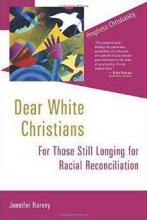
A white scholar touring churches across the nation is trying to convince Christians that racial reconciliation is not enough — it’s time to start talking about reparations for descendants of slaves.
And among mostly white, mainline Protestants this controversial — some would say unrealistic — notion is getting a hearing.
What divides the races in America, says Drake University ethicist Jennifer Harvey, is not the failure to embrace differences but the failure of white Americans to repent and repair the sins of the past.
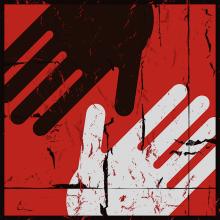
#BLACKLIVESMATTER is being touted as our uniquely contemporary civil rights movement. Yet it bears striking resemblance to the black power movement of decades past.
Who can represent #BlackLivesMatter, be involved, or be its leaders? It’s clear that black people can. Can others? And what sorts of black folks? Ben Carson? Cornel West? Two of the three co-founders are queer black women. And what about the role of the faith community, of clergy? The movement’s incredible racial justice work notwithstanding, it puts on display the identity politics that continue to complicate the body politic in contemporary American life.
Jennifer Harvey’s Dear White Christians: For Those Still Longing for Racial Reconciliation (Eerdmans) is one of the most significant recent books addressing identity and politics, focusing on the intersections of race, anti-racism, and religion. In its pages, Harvey, an American Baptist minister and associate professor of religion at Drake University, deconstructs reconciliation as a paradigm and offers a constructive practical vision of reparations. Harvey’s work in trying to make sense of her own embodied white identity—through her studies at Union Theological Seminary and service in a host of ministry settings addressing racial justice—provides background that allows her to explore multiple racial justice issues, making her book relevant for an intercultural audience.
Harvey’s thesis is clear: Reconciliation as a paradigm has failed to address racial injustice in the U.S., and the church needs to shift to a reparations paradigm to better address our racial situation. In a reconciliation paradigm, racial separation denotes racism, making diversity and togetherness the primary criteria for determining racial righteousness in the church. Issues related to structural justice are significant within visions of reconciliation, but they take a back seat to the ultimate concern of inclusion.

Without a commitment to having hard conversations, and without healthy outlets for them, disagreements can be terrifying. They can seem like the end of the world, especially in the rarified atmosphere of our churches.
Unfortunately, Christians often deal with disagreements in their congregations in one of a handful of ways. We might disagree only in public, or only in denominational forums; we might talk only to our pastor, or only to the people who agree with us; we might let our money do the talking for us; we might not say anything at all; or we might split — leave, get kicked out, break fellowship.
But it doesn’t have to be this way. We can create a culture of rich dialogue, even around our disagreements. We can cultivate community conversations marked by gracious space and spacious grace. This unity is possible because we are bound by a covenant

We think it's wrong for a woman, much less a mother, to be angry. And so when anger inevitably, righteously, hits us — with its cousin fatigue and its brother frustration — we don't know what to do except to bury it beneath a smile that gets thinner and weaker as the day winds on.
We all get angry, though. It is a function of being human, and I daresay without anger we would never have won women the right to vote, school desegregation, or any other host of advances that came about when people got righteously angry and unleashed the power of justice and the Holy Spirit.
So be angry when you are angry. The Bible says so. Do not be ashamed to say, in the moment, "This is not right. I'm angry."

The early Christians had to deal with the loss of their most important mandala — the one they called their Lord and Savior, Jesus Christ. Isn’t Christianity weird? I mean, Christians revere Jesus the Messiah, the King. That’s weird because the one Christians revere as the incarnate word of God was killed. He became a victim of human violence.
How do you atone for that? How do you reconcile with the fact that the one whom Christians worship became a victim of human violence?

If it is simply a matter of forgiving, perhaps better stated as reconciliation, that still leaves the question of the kind of “just world” people are trying to develop—or ought to develop.

Fifty years ago, the sleeping giant of America’s religious communities shook off their sleep and rose to change the country in a crisis over whether democracy would grow or falter.
Today we face a crisis over the very fabric of life – human and more-than-human – on our planet. Is there anything the religious communities, now yawning their way just beginning to awake, can bring to dealing with that crisis?
There is. Much of it comes from the Hebrew Scriptures, what Christians call “the Old Testament.” It reaches a climax in the Exodus story, recalled each year in the Jewish festival of Passover and to some extent in the Holy Week that in Christian tradition is rooted in Passover. But it pervades the Hebrew Bible.
For that is the record of the spiritual struggles of an indigenous people of shepherds and farmers in their relationship with YyyyHhhhWwwwHhhh, the Holy One Who breathes all life. They centered their God connection in sacred relationship with their land, especially through the foods they grew and then offered on the altar.
Our own generation, facing a catastrophic crisis in the Earth-earthling relationship, must go back to the Bible for guidance on how to apply indigenous wisdom to the planet as a whole.

In the last several days, our country has witnessed and experienced, yet again, the effects of the unresolved issues of racism. We cannot rest complacent, convincing ourselves that everything is and will be all right on its own. That is a lie. The racial divide in the United States is boiling — we see the big cloud that rises over the roaring mountain. If we don’t act, the volcano will eventually explode. Our all-gracious God is calling us to turn from our wrong path.
Above other civic institutions, the church is responsible to do the work of healing. Our nation is desperately in need of healing. The sins of racism, classism, violence, and ideological intransigency are violently shaking and destroying the soul of our nation.
Where are the godly leaders in our country who are ready and willing to strip their souls of religious and ideological allegiances and surrender without fear, to seek the path that the Holy Spirit is eager to show us?
There is a way forward. We know that Jesus the Christ came to show us that way. We need to quit insisting that the way forward is my way. It is not my way — it is Christ’s way. No one Christian leader can claim to speak for God. Neither does God need any one of us to make the way clear — God can speak for God’s self.
There is one condition necessary for us to hear God’s voice: “If my people who are called by my name humble themselves, and pray and seek my face and turn from their wicked ways, then I will hear from heaven and will forgive their sin and heal their land.” (2 Chronicles 7:14.)
Someone once said that change happens by listening and then starting a dialogue with the people who are doing something you don't believe is right. There is no virtue in sticking to our allegiances. Our allegiances should not be to the right or the left or even the center. If we follow Jesus, our allegiances are to repentance, forgiveness, and reconciliation. Our life and our only hope are found in the Gospel of Jesus Christ.
Thomas Merton wrote, “You do not need to know precisely what is happening, or exactly where it is all going. What you need is to recognize the possibilities and challenges offered by the present moment, and to embrace them with courage, faith, and hope.”
The truth is that we do know what is happening, and we know what is going on. Our individual and collective sins are robbing us of our dignity. We, the Christian leaders of this country, can choose to wage war with the weapons of our ideological, denominational, and theological perspectives and convictions. Or we can choose to “recognize the possibilities and challenges offered by the present moment, and to embrace them with courage, faith, and hope.”
IN JUNE 1966, Sen. Robert Kennedy joined the National Union of South African Students for a conference held in Cape Town. Tension was running high. NUSAS president Ian Robertson had been banned under the Suppression of Communism Act, and the pressure was on Kennedy, from both the apartheid government and sectors of the anti-apartheid movement, not to attend.
Kennedy went anyway and delivered one of the best speeches of his career. “Few have the greatness to bend history itself,” Kennedy reminded the students. “But each time a [person] stands up for an ideal, or acts to improve the lot of others, or strikes out against injustice, [s/he] sends forth a tiny ripple of hope ... daring those ripples to build a current which can sweep down the mightiest walls of oppression and resistance.”
Twenty-eight years later Nelson Mandela became the first democratically elected president of South Africa. The West embraced him, celebrating his magnanimity, “disremembering” the support it gave to the very apartheid regime Mandela worked to dismantle.

Elsewhere, Courtney describes the effect as recognizing the blood of your enemies physically pumping in your veins. It is a striking example of interdependence — physically and metaphysically.
Perhaps what’s spiritual is what’s biological. In the midst of the ongoing violence, Preemptive Love Coalition performed its 1,000th heart surgery last month.
Fr. Nabil Haddad is a passionate and energetic man. As a Melkite Catholic priest and dean of Old Cathedral in Amman, Jordan, he is especially passionate about fostering peace and reconciliation between Christians and Muslims. This work keeps him very busy, as he travels often to bring his message of peace as far and wide as possible.
The day before we met, Fr. Nabil announced at a press conference a new initiative called Karama. Karama is the Arabic word for dignity. He stressed the importance of coexistence between the Abrahamic faiths and how this can be achieved through education focusing on human dignity and by talking about citizenship. Fr. Nabil said this approach is very successful in reaching the hearts and minds of the Muslim community.
“Do not make the religion of Islam the problem,” he said. “Instead use our vibrant witness – that is what is lacking in other societies.”
THE CRY OF the church to the world should be “Forgive us.”
At a time when the American church struggles with finding its place in the world and struggles with asserting its identity, could the church be known as the community that models confession, repentance, and the seeking of forgiveness? At this moment in history, the American church is often ridiculed or portrayed as unforgiving and ungracious. Could the church offer a counter-narrative, not of defensiveness or derision but of an authentic confession and genuine reconciliation? By examining seven different areas where the church has committed sin, we ask the church to consider the spiritual power and the theological integrity of a church that seeks forgiveness for those sins.
Our scriptures testify to the necessity of confession. Confession is central to the Christian faith. The importance of confession arises from the Christian view of sin. Sin is a reality and must be taken seriously. Evangelicals consistently begin our gospel presentation with the centrality of sin to the human experience. American evangelicals often assert that the beginning of the work of God’s forgiveness is the recognition of our need for God because of human sinfulness.
It is antithetical to the gospel when we do not confess all forms of sin—both individual and corporate. The reason evangelicals can claim to be followers of Jesus is because there has been an acknowledgement of sin and the seeking of God’s grace through Jesus Christ that leads to the forgiveness of sin.

WHEN IT COMES to speaking out on sexual violence, the first barrier for pastors is awareness of the problem, according to a LifeWay poll, “Broken Silence.” Commissioned by Sojourners and IMA World Health, the poll—released in June—surveyed Protestant pastors across the United States on their views on sexual and domestic violence. That church leaders don’t often discuss sexual violence is not surprising; for perhaps the first time in the United States, the poll puts numbers to just how few actually do—and illuminates some reasons for the silence.
The lack of awareness of sexual violence is a multipronged problem. According to the poll, 74 percent of surveyed pastors underestimate the level of sexual violence experienced by members of their congregations. In part, this gap reflects a failure to understand the tragic ubiquity of sexual violence—1-in-3 women in the United States, and 1-in-4 men, will experience intimate partner violence in their lifetime. In a country in which 80 percent affiliate with religion, statistics strongly indicate that this issue is as pervasive within congregations as without.
Another problem, however, is around the willingness to believe it is happening. Of the pastors who talk about sexual violence, 72 percent do so because they believe it happens in their local community—but only 25 percent acknowledged that their own congregants may have experienced it.
“It couldn’t happen among Christians” is, sadly, a very common refrain among faith institutions. Reported instances of sexual abuse this year at Christian colleges, from Patrick Henry to Pensacola, indicate the deep costs of this refusal to ask whether sexual violence could happen “within the flock.”
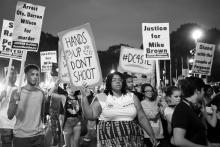
ON AUG. 9, Michael Brown, an unarmed black teenager, was shot to death by Ferguson, Mo., police officer Darren Wilson. A collective groan was let out across social networks—people began the lament “Not again.”
Just four days prior, John Crawford III, a 21-year-old black man, had been gunned down by police in a Walmart in suburban Dayton, Ohio, without warning, while shopping for a BB gun. A few weeks earlier, Eric Garner, an African-American man, was choked to death by a New York City police officer.
For young black men, each incident is a reminder of how easily our lives can be taken away by police aggression. For the people in Ferguson, however, over-policing is all too familiar. In a city where 67 percent of the residents are black, there are only three black police officers on a force of 53.
A 2013 report from the Missouri attorney general’s office revealed just how bad relations are between officers and black citizens. Out of the 5,384 traffic stops made last year by the Ferguson Police Department, 86 percent of them targeted black drivers. Black drivers were searched and arrested at nearly twice the rate of white drivers, although contraband was found at a rate 13 percent less than that of white drivers.
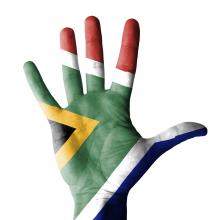
SOUTH AFRICA has meant a lot to Sojourners over the years. In the 1980s, I was invited to come to South Africa by key church leaders there, including Beyers Naudé, the first white minister defrocked by the Dutch Reformed Church for opposing apartheid; Desmond Tutu, the Anglican archbishop of Cape Town; theologian and preacher Alan Boesak; and Frank Chikane, a Pentecostal minister who came up through the ranks of the movement to lead the South African Council of Churches.
They became my “comrades,” as they say in South Africa, for six weeks that happened to fall during Lent—it was a powerful season for me of seeing and feeling the pain of that beloved country while looking for the hope that comes from people who make costly commitments. Together we worked on a strategy between South African and U.S. church leaders to end apartheid.
Ten years later I returned to witness the victory of that hope in the miracle of Nelson Mandela’s inauguration as South Africa’s first black president, and later came back for an international reunion of anti-apartheid activists. Those formative years in the South African movement for freedom helped give me my theology of hope—which I learned means believing in spite of the evidence and watching the evidence change.
MULTIRACIAL CHURCHES are becoming more common in this country—but that doesn’t happen by chance.
A 2010 study by the Hartford Institute for Religion Research, based on a random sample of more than 11,000 congregations, revealed an increase in multiracial congregations in the U.S.—30 percent of churches reported that more than half of their members were part of minority groups.
Members of three multiracial churches in and near the nation’s capital—one Catholic, one Methodist, and one nondenominational—say that at their church “people don’t look the same, or think that much about it,” and describe their congregations as welcoming places “where you can feel God’s presence, where you can be yourself.”
Though Sunday worship time is still known as “the most segregated hour in America,” older members of churches such as Peace Fellowship Church in Washington, D.C., St. Camillus Catholic Church in Silver Spring, Md., and Culmore United Methodist Church in Falls Church, Va., remember when things started changing. As migration and demographic shifts altered neighborhoods and communities, members sought to engage in “desegregated” worship, opting to join communities that mirrored a world with different cultures and ways to praise God.

AS CHRISTIANS concerned about peace and justice, this time of crisis in the Middle East provides us an opportunity to return to our principles, the “springs of living waters” for people of faith:
- We need to oppose both anti-Semitism as well as any form of discrimination and racism against Palestinian Arabs. Solutions that promote or tolerate discriminatory and racist institutions and practices should be forthrightly condemned. Settlements, illegal under international law and discriminatory against Palestinians, need to be rejected rather than tolerated and legitimized.
- We need to work for justice, which requires that we work for a solution that levels the playing field rather than seek a “realistic” approach that reflects the balance of power between the parties, necessarily favoring the strong against the weak.
- We need to seek reconciliation and peace between the parties, rather than assuming eternal hostility and enmity between the parties.

I’ve had the chance to speak with author and international peace activist John Paul Lederach about his book, Reconcile: Conflict Transformation for Ordinary Christians. The book, updated from an earlier edition with a new introduction from Bill and Lynne Hybels and additional stories, is a powerful guide on how to seek and realize peace among us on both local and global scales.
Having traveled the world brokering peace agreements between governments and rebel groups, and having risked his own lives and that of his family for the sake of reconciliation, Lederach speaks prophetically to difficult issues facing us today in a way that few can.
From Gaza to Iraq and even Ferguson, Mo., we want to know: what do we do now? Thankfully John Paul Lederach offers us both the hope and the tools to begin achieving reconciliation, wherever we are. In our discussion below we talk about his book, which is capturing the attention and imaginations of leaders everywhere.
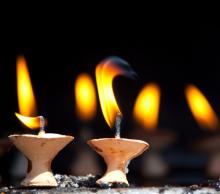
“What did you do on your summer vacation?”
Even now students may be answering that question in essays at the start of this new school year. Maybe you wrote such a paper years ago. No matter what you did or where you went this past summer, it was almost impossible to escape the heaviness of the headlines. #BringBackOurGirls has become a distant refrain, almost forgotten beneath the crush of summer tragedies:
Thousands of children traveled alone from Central American countries to enter the U.S. as refugees. Ebola deaths spread to more West African nations killing hundreds including many health workers. The forces of ISIS, intent on carving out an Islamic caliphate, took over major Iraqi cities and beheaded a U.S. journalist in Syria. Russia usurped Crimea and threatened the rest of Ukraine. The U.N. refugee agency announced in late August that “the number of refugees, asylum-seekers and internally displaced people worldwide has, for the first time in the post-World War II era, exceeded 50 million people.” Gaza has been reduced to rubble while Hamas rockets still fly toward Israeli cities. Michael Brown, an eighteen-year-old African American man who might have started college this week, was shot and killed by a white police officer in the waning days of August.
After such a summer, how can we do anything but scoff at Paul’s words from Romans?

In recent years, my family has navigated some rough patches: death, cancer treatments, open heart surgeries, chronic disease, etc. Now, I’m certain this isn’t everyone’s experience, but mine has been that in these times of trauma or tragedy, family comes together to stand with one another as we wrestle through life’s crap. We aren’t picking fights, we are crying on each other’s shoulders.
In recent months, our human family has been enduring an especially rough patch.
War.
Racism.
Suicide.
Deadly viruses.
Plane crashes.
Whether in remote villages or urban centers, few have been untouched (in some way) by the realities unfolding.
As I observe our corporate response to tragedy as a human family, and evaluate my own response in the midst of it, I have noticed something disturbing unfold. Rather than rally together as a family navigating a season of trauma, we have used this moment to divide, stir hatred and misunderstanding, point fingers, and more than anything, view those on the opposite side of an issue as less than human.